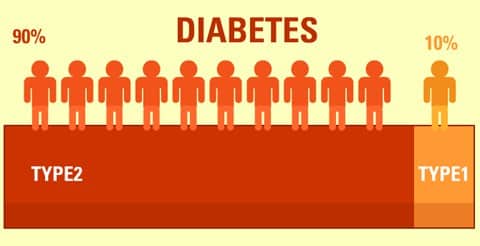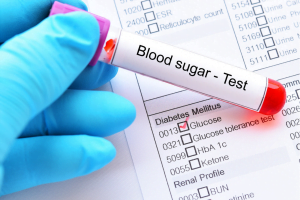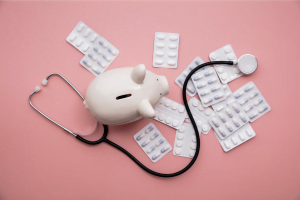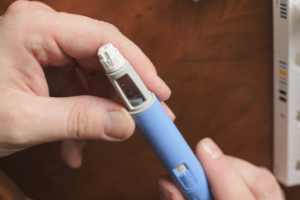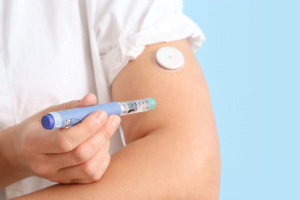What is type 1 diabetes (T1D)?
T1D occurs when the immune system attacks the beta cells in the pancreas, which are responsible for producing insulin. Without insulin, the body cells cannot absorb glucose from the blood. This leads to a build up of glucose in the blood. To stabilize their blood sugar levels, people with type 1 diabetes are prescribed to use insulin injection every day. T1D diagnosis is most common in childhood/young. The method of treatment for this condition involves injecting insulin under the skin. If you have T1D, you can live a healthy long life so long as you make the necessary changes to your lifestyle and follow your treatment plan.
What is type 2 diabetes (T2D)?
Previously known as non insulin dependent diabetes, T2D is the most common type of diabetes that affects 90 – 95 percent of adults with diabetes. Type 2 diabetes refers to a medical condition where the body cannot make enough insulin or use it properly. Because of insulin resistance, which refers to a condition where the body cells become resistant to insulin, your body will try and compensate for the demand of insulin by producing more. However, the beta cells will fail to keep up with the increased demand for insulin. People who are obese are more likely to develop T2D, including related health conditions. T2D does not have any cure, but it can be controlled through weight management, exercise and proper diet. Although T2D is common in adults, you can develop it at any age.
Differences and similarities between type 1 vs type 2 diabetes
Similarities
If left untreated both T1D and T2D may lead to health complications such as:
- Heart disease
- Kidney failure
- Stroke
- Blindness
- Amputated limbs
Also, both T1D and T2D often result in abnormally high levels of blood sugar. Blood tests that are used to diagnose T1D and T2D include glucose tolerance test, hemoglobin A1C, and fasting blood sugar. Before diagnosis, you may experience similar symptoms between T1D and T2D. They include excessive thirst, excessive urination and excessive hunger. Exercising regularly can help increase insulin sensitivity in both diabetes. Exercising regularly is important for type 1 diabetic patients since it will help them maximize on insulin usage. This may reduce their daily insulin requirements. Insulin resistance is a common condition in people with type 2 diabetes. However, exercising regularly can help reduce insulin resistance. However, there are some differences between T1D and T2D, such as the cause of the condition.
Differences
Type 1 diabetic patients usually experience episodes of hypoglycemia or low blood sugar levels. In this case, patients may experience symptoms such as fatigue, sweating, anxiety, irritability, hunger and heart palpitations. Hypoglycemia can be treated quickly by taking fast acting sugar, such as non diet soda and hard candy. If left untreated, hypoglycemia can become severe, which may lead to life threatening conditions. Hypoglycemia is common in type 1 diabetic patients because patients with this medical condition rely on insulin injections, and in case they take more than what is recommended, it may lead to low blood sugar levels. On the other hand, people with T2D do not experience episodes of low blood sugar levels unless they are taking diabetes medications. Usually, type 1 diabetes cannot be prevented. However, T2D is preventable with proper diet, regular exercise, and weight loss. Another difference between type 1 and type 2 diabetes is that T1D symptoms usually begin in childhood or young adulthood. While in T2D, a person may not experience symptoms before diagnosis.
Since people with type 1 diabetes, don’t make any insulin, they have to take insulin injections or an insulin pump to control the condition. On the other hand, type 2 diabetes is normally controlled through regular exercise, weight loss and proper diet. In case diet and exercise doesn’t work, patients with T2D may require medication to help them manage their blood sugar levels. T1D is caused by an autoimmune response against the beta cells that is responsible for producing insulin. This happens after immune system mistakes beta cells for foreign cells and starts to destroy them. It is not yet known what really causes T2D , but it is believed to be caused by weight, physical inactivity, age and genetics. Unlike type 1 diabetic patients who may occasionally taste sugary foods such as cake, it is dangerous for people with T2D to do the same. This is because people with type 1 diabetes take insulin regularly, which helps them control their blood glucose levels. On the other hand, people with T2D may also rely on diet and exercise to control their blood sugar levels, and not insulin. Therefore, if they do not watch their diet, it may cause their blood sugar levels to reach dangerous levels.
Whereas type 2 diabetes is commonly associated with overweight, T1D is not associated with overweight. When first diagnosed, type 1 diabetic patients usually have reduced weight. On the other hand, type 2 diabetic patients have a weight gain. Type 1 diabetes is usually associated with high levels of ketones during diagnosis. On the other hand, T2D is associated with high cholesterol levels and blood pressure levels
Disclaimer: Please note that the contents of this community article are strictly for informational purposes and should not be considered as medical advice. This article, and other community articles, are not written or reviewed for medical validity by Canadian Insulin or its staff. All views and opinions expressed by the contributing authors are not endorsed by Canadian Insulin. Always consult a medical professional for medical advice, diagnosis, and treatment.

